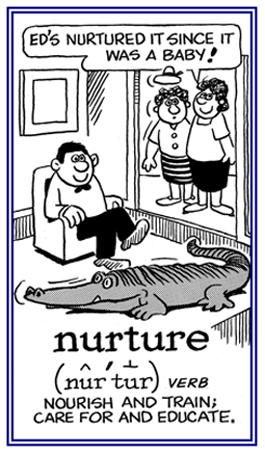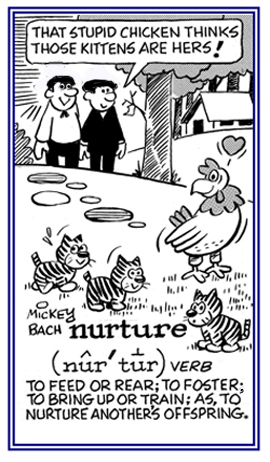nutri-, nutrit-
(Latin: nutrire; to nourish, to feed, to nurse, to foster, to support, to preserve)
- Proteins are the main structural component of tissue and organs and they are essential for the growth and repair of cells in the body.
- Carbohydrates are food groups that contain sugars and starches and they are the main energy sources required for metabolism or the chemical processes that take place within cells and they should make up at least half of people's diets.
Unrefined or unprocessed carbohydrates found in cereals and fruit are usually richer in fibers than refined carbohydrates; such as, sugar and white flour.
- Fats provide energy for metabolism and are a structural component of cells.
Saturated fats are found mostly in meat and dairy products and increase the amounts of unwanted types of cholesterol in the blood.
- Fibers are the indigestible structural material in plants and they are an essential part of a healthy diet.
- Water constitutes a high proportion of many foods and it is essential to maintain the chemical processes within cells and normal bowel functions.
- Vitamins ensure the healthy functioning of the brain, nerves, muscles, skin, and bones.
- Minerals consist of calcium zinc, and magnesium all of which are needed in small amounts to control cell metabolism and table salt is needed to maintain fluid balance.
Some causes of malnutrition can be a result of not having enough to eat, not eating the right things, or being unable to digest the food that one does eat.
2. Etymology: from Latin mali-, "bad, poor, poorly" + nutritionem from nutire, "a nourishing" + -tion, "act or process of".2. To keep a feeling or a belief in one's mind; usually, for a long time: Harry has long nourished an ambition to play a piano with the local orchestra in a concert.
3. Etymology: from Latin nutrire, "to feed".
2. Pertaining to the components necessary to be as healthy as possible: Gertrud prepared a nourishing dinner for her family with fresh vegetables and fish.
2. The act of taking care of another person or people: Much attention to nourishment has been necessary to save the lives of many refugees all of whom need help.
3. Etymology: from Latin utrire, "to suckle, to feed".
Unusual information about the nourishment of certain foods.
- Celery has negative calories because it takes more calories to eat a piece of celery than the celery has in it to begin with.
- The candies that are most likely to cause tooth decay are dark chocolate and fudge.
- A person needs to eat eleven pounds of potatoes to put on one pound of weight, because a potato has no more calories than an apple.
As late as 1720 in America, eating potatoes was believed to shorten a person's life.
Those least likely to damage the teeth are nut-covered or coconut-covered candies.
The most harmful items which are baked are chocolate-chip cookies, frosted cakes, and Graham crackers and the least harmful to the teeth are pies, plain cakes, and doughnuts.
Believe the foregoing information or not, it's up to you!
2. Etymology: from Latin nutrire "to suckle, to nourish".
2. To breastfeed a baby: After giving birth to her son, Hana was nursing little Finn for six months, knowing that her milk was the best for him.
3. To carefully treat someone or something: Dianne always nursed her roses in the front yard and fertilized them on a regular basis and that is why they are so beautiful.
2. A structure or indoor garden where plants are grown and taken care of: Jason and Jane went to the nursery to find and to buy a small tree to plant in their garden.
3. A kind of school which takes care of small children whose parents are at work: Timmy went to the local day nursery where he was able to play and get along with other small children before attending an elementary school.
The ideal nursing home is well equipped with registered nurses, as well as nurses' aides, has regular visits from a physician, provides access to advanced medical care facilities, and is closely linked, both organizationally and geographically, to community hospitals.
2. Etymology: from Latin nutrire, "to feed, to nurse, to foster, to support, to preserve".

Go to this Word A Day Revisited Index
so you can see more of Mickey Bach's cartoons.


